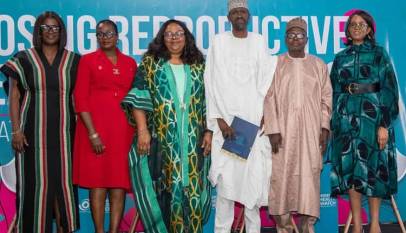OP-ED: | Nigeria’s memory loss challenge: The burden and way forward, By Isyaku Yarube
Are you becoming more forgetful? Do you often get confused as to whether or not you have locked the front door of your house? Do you often forget where you kept your car keys or often miss your scheduled appointments? If you are above forty-five years old and your answer to all or most of these questions is yes, then your time has come – and you’re entitled to it.

When you pay a visit to your 65-year-old favourite aunt, whom you last saw a year ago and is so elated to see you such that she could barely find the right words to tell you how happy she was to see you. Yet, she fails to recall your name, it is a different ball game all together – she is not entitled to it. In both situations, something is wrong, but to a different extent.
What is memory loss?
A number of related terms are being used interchangeably in this regard. Memory loss refers to a condition when our ability to recall what we already know is impaired. Amnesia, as it is called, is a partial or total loss of memory. Cognitive impairment connotes deterioration of memory alongside other brain functions such as language, perception, thought and others (collectively called cognition), yet the sufferer is able to carry out the normal activities of daily living.
In dementia, the severity of cognitive impairment is to the extent that the sufferer is unable to carry out regular activities of daily living; and thus has become dependent on care givers for most of their needs.
What causes memory loss?
A host of different conditions can lead to memory loss. One of them is the so-called age-related memory loss, a condition associated with mild deterioration of cognition seen in many individuals due to aging. Others are Alzheimer’s disease, and other diseases or injury that affects the brain, including stroke, diabetes, head injury, alcohol abuse, certain medications (sedatives), emotional shock or trauma such as the one seen in victims of violent crimes.
Risk factors for memory loss include age (above 65 years), lack of regular exercise, smoking, excess body weight, unhealthy diet, high blood pressure, excess cholesterol and blood sugar levels, depression, low educational attainment and social isolation.
The burden of memory loss in Nigeria
According to the World Health Organisation (WHO), around 50 million people worldwide are suffering from dementia, with nearly 60% of them living in low- and middle-income countries. About 5-8% of the general population aged 60 and over is living with dementia. Every year, there are nearly 10 million new cases. Much of this increase is linked to the rising numbers of people with dementia living in low- and middle-income countries. With Nigeria’s current population of 206,139,589, and forecast population of 401,315,000 by 2050, the population of people with dementia is expected to rise from the current estimate of 14 million to over 28 million by 2050.
Dementia has significant social and economic implications in terms of direct medical and social care costs, the costs of informal care, as well as economic losses. In 2015, the total global societal cost of dementia was estimated to be USD818 billion, or about NGN311 trillion. This cost ranges between 0.2% – 1.4% of GDP, varying among low- and middle-, to high-income countries. For Nigeria, whose GDP is USD494.6 billion ( as at 2015), this cost translates to about USD1 billion or NGN375 billion. This is a huge burden representing about 0.03% of the country’s annual national budget; it is equivalent to more than three times the capital allocation to agricultural sector in the 2021 budget.
Apart from these figures emanating from global estimates on dementia, there are no accurate statistics on the real socio-economic cost of memory loss in Nigeria. This is due to the lack of comprehensive nationwide research on the phenomenon. Indeed, the burden of memory loss will include not only dementia, but also the multitude of diseases and conditions that present as or with memory loss. However, statistics on many of these contributing diseases and their economic impact are not available.
Only a few locally conducted academic studies give insight into the challenge of memory loss, namely: Mavrodaris (2013), Adeloye (2019), and Yusuf (2011), and these studies are mainly restricted to one specific part of the country or another, with reported prevalence rates of dementia ranging from as low as 0-2.79% to as high as 4.9-10.1%.
In 2018 and 2019, my co-researchers and I conducted hospital-based studies in Kano that examined the prevalence of cognitive impairment in different conditions. Our findings revealed majority of the diabetics had impaired cognitive function. Similarly, cognitive impairment was observed in 79% of stroke survivors, 86.7% of hypertensive patients and 88.3% of first-time-pregnant women. This high local burden of memory loss and dementia is a source for concern and a call for a search for a remedy that may be locally available.
Obviously, there is the need for a standardized, large-sample, multi-centred, country-wide study to generate good estimates on the burden of memory loss in Nigeria. Having good estimates is necessary for policymaking and healthcare delivery planning regarding cognitive impairment and dementia in Nigeria.
Way forward on memory loss in Nigeria
A multi-prong approach is required to tackle the challenge posed by the apparently huge burden of memory loss in Nigeria. First, the WHO recommendations regarding dementia are crucial and therefore should be implemented. Having recognized dementia as a public health priority WHO has thus come up with a comprehensive plan of action called the Global action plan on the public health response to dementia 2017-2025 which provides a comprehensive blueprint for action – for policy-makers, international, regional and national partners, and WHO. Nigeria needs to key into this plan.
The Global Dementia Observatory was established as a data and knowledge exchange platform to facilitate monitoring and sharing of information on dementia policies, service delivery, epidemiology and research. WHO also developed a number of documents and guidelines to harmonize and facilitate actions across its member countries. Some of these documents include: Towards a dementia plan: a WHO guide, Guidelines on risk reduction of cognitive decline and dementia, Mental Health Gap Action Programme (mhGAP) and iSupport, a training and support manual for carers of people with dementia, available both as an online version and also in a hard copy format.
Equally important is improving access to care by the affected persons, especially the patients and their caregivers. This can be achieved by training and retraining of personnel to handle patients with memory loss. In this regard, there is need to establish memory clinics as well as specialised centres to cater for people with memory-related problems in all tertiary hospitals across the nation; this is hardly the practice currently anywhere in the country.
Moreover, adequate funds should be made available for research and innovation in the area of memory loss. It is vital to start by conducting a nationwide, multi-centred studies in order to identify more accurate statistics on memory loss in Nigeria. Search for remedies from local herbs to alleviate memory loss should be enhanced. Government needs to provide adequate funding and enabling environment for this, through its various institutions such as the National Research Fund/TETFund, research institutions and universities.
Healthcare and pharmaceutical companies, financial institutions and non-governmental organizations (NGOs) should also play a crucial role in this endeavour.
In addition, journalists and public educators have a big role to play towards addressing the burden by creating awareness about memory loss and dementia – their preventive measures and where to access care and support. They can as well help to draw the attention of government and spur it to action on the problem. The general public can make a difference by altering their behaviors towards avoiding risk factors for memory loss and dementia as highlighted above.
The general public can also contribute to this cause by creating NGOs to support the cause of dementia and memory loss. A few already exist, such as the Dementia Care International, Nigeria–Dementia Friendly Communities and Dementia Care Society of Nigeria. Yet, more needs to be done to address this growing health challenge. With concerted efforts, members of our society with forgetfulness will not be forgotten.
Isyaku Umar Yarube, a professor of physiology at the Bayero University, Kano (BUK), is a fellow of the African Science Literacy Network (ASLN). This article was written with a financial support from the ASLN.














